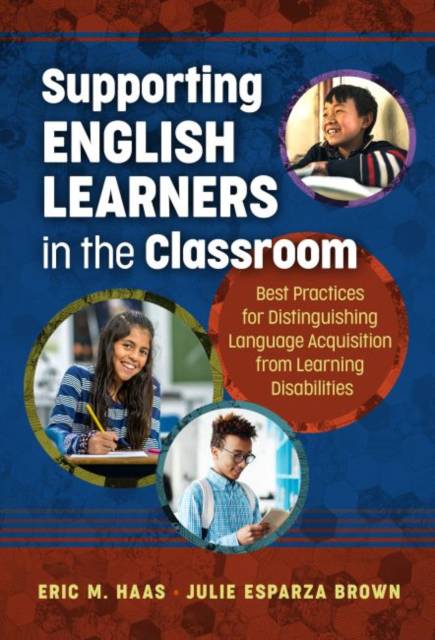
- Retrait gratuit dans votre magasin Club
- 7.000.000 titres dans notre catalogue
- Payer en toute sécurité
- Toujours un magasin près de chez vous
- Retrait gratuit dans votre magasin Club
- 7.000.000 titres dans notre catalogue
- Payer en toute sécurité
- Toujours un magasin près de chez vous
Supporting English Learners in the Classroom
Best Practices for Distinguishing Language Acquisition from Learning Disabilities
Eric M Haas, Julie Esparza BrownDescription
In this important resource, educators will find evidence-based best practices to help them address the individual needs of English learners with academic challenges and those who have been referred for special education services. The authors make the case that systems can be put in place at three levels to help English learners succeed: the classroom level, before and after identification; the support-team level, when support plans are developed and assessed; and the system level, where programs and professional training plans should be continually developed, assessed, and revised. Putting theory into practice, this book offers guidance and specific tools to help districts, schools, and classrooms use Multi-Tiered System of Supports (MTSS) and other interventions to promote higher levels of achievement for ELs with academic challenges or learning disabilities.
Book Features:
- Highlights a prevention-oriented model aimed at providing supports to help all learners succeed.
- Outlines a culturally and linguistically responsive MTSS framework and includes guidance on appropriate instruction, assessments, and decisionmaking for ELs.
- Highlights an instructional overlay to typical interventions that align with EL students' language levels and experiential and cultural backgrounds.
- Describes processes that lead to the appropriate identification of EL students with an intrinsic learning disability, such as the use of "true peer" determinations.
- Addresses the reasons for under- and over-representation of EL students receiving special education services and ways to ensure appropriate and legally defensible eligibility decisions for ELs.
- Describes action steps that can be implemented system-wide to improve policies and procedures.
- Presents the legal rights of students and the legal responsibilities of schools for English learners, students with disabilities, and ELs with disabilities (dual-identified).
- Discusses the different needs of, and support services for, elementary versus secondary EL students.
- Promotes collaboration between educators who currently specialize in English language acquisition, special education, and subject-matter content.
Spécifications
Parties prenantes
- Auteur(s) :
- Editeur:
Contenu
- Nombre de pages :
- 240
- Langue:
- Anglais
Caractéristiques
- EAN:
- 9780807759530
- Date de parution :
- 03-05-19
- Format:
- Livre broché
- Format numérique:
- Trade paperback (VS)
- Dimensions :
- 175 mm x 254 mm
- Poids :
- 317 g







